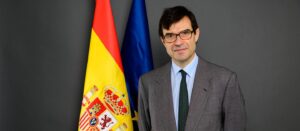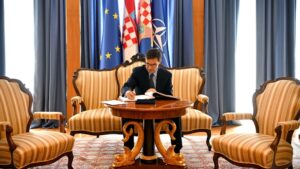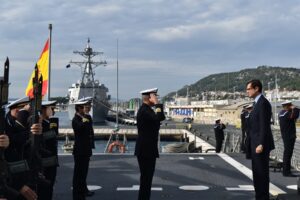As far as trade and investments are concerned, we can both be satisfied with our achievements.
Spain presides over the EU Council until the end of 2023. H.E. Mr. Juan González-Barba, Spanish Ambassador to Croatia, in addition to the topic of the EU presidency and the priorities of official Madrid, explains in which areas there is progress for cooperation between Spain and Croatia. Special attention is paid to the economy and scientific research.

- What is your opinion of the relations between Spain and Croatia today, given that both countries are members of the EU and NATO? Are there any open issues?
The decade that Croatia has been member of the EU is the main factor behind the strengthening of bilateral relations in all domains. Politically, the level of visits exchanged has been unprecedented in the last three years: Prime Minister Andrej Plenkovic visited Spain in March 2022, and the Speaker of Sabor did so in May 2022. Prime Minister Pedro Sánchez visited Croatia in October 2021 and again in February 2023. There have been many other visits at Ministerial level in both ways, but the highlight has been undoubtedly the official visit by King Felipe and Queen Letizia in November 2022, the first visit ever of the Spanish monarchs to mark the 30th anniversary of the establishment of diplomatic relations. Queen Letizia returned to Zagreb only half a year later to participate in the European conference on child obesity organized by the WHO and Croatia’s First Lady.
Croatia has joined this year the very core of the EU integration project, with her participation in both the Eurozone and the Schengen area, which has increased our co-operation even further. Two years before, Croatia joined the informal grouping called MED-7, now MED-9. Spain organized the informal MED-9 summit in Alicante last December and one of the most published photos of the event was one of European leaders around Prime Minister Plenkovic watching on his mobile the round of penalties of the World Cup match of Croatia vs. Brazil.
It is very remarkable that the main project in our bilateral cooperation should be in the field of scientific research. Spain and Croatia are leading the IFMIF-DONES initiative, focused on the development of ultra-resistant materials needed for the technological applications of energy liberated by the nuclear fusion process, once it is fully mastered. The project was officially launched by the signature of a MoU by the relevant ministers in the presence of the King and Queen of Spain and the President of Croatia and his wife. IFMIF-DONES is carried out within an EU framework, with substantive financing by the Commission, open to the participation of the remaining EU Member States plus some other international partners.
People-to-people contacts are worth mentioning, since they constitute the foundations on which official relations are built. Tourism, especially of Spaniards to Croatia, is increasing every year, with numbers approaching 400.000 visitors. These are quite impressive numbers, if one takes into account that most tourists arrive by plane and that Spain is a very popular sun-and-beach destination too. Croatia and Spain have become popular choices for our Erasmus students from our respective countries. I cannot fail to mention to what extent sports, and particularly soccer, has contributed to enhance the awareness and positive image of Croats in the eyes of Spaniards and viceversa.
- The economy is a very important aspect when it comes to relations between countries. What do the numbers show when we talk about Spain and Croatia? Where do you see room for improvement of economic co-operation?
As far as trade and investments are concerned, we can both be satisfied with our achievements. Starting from negligible amounts of bilateral trade not so long ago, we have recently managed to surpass the symbolic threshold of 1 billion € of yearly trade exchanges. Likewise, bilateral investments are growing. The main sector of Spanish investments in Croatia is renewable energy through ACCIONA, which is already operating a wind farm and is in the process of building and operating a second one plus a solar plant.
I foresee an increased cooperation and interest, at least as far as Spanish economic operators are concerned, in two specific areas. Firstly, in high-tech and AI business developments, where Croatia is proving a very fertile ground for innovation, but also in the renovation of the Croatian railway network, including high-speed trains, where Spain has acquired a proven leadership with the most extensive high-speed railway network in Europe, only second to China in the rest of the world.
- Spain presides over the EU until the end of the year. What have you singled out as priorities and to what extent are they implemented in the field? Which area has the most problems?
Prime Minister Sánchez summarized our goals and priorities for the current semester in four main areas: fostering Europe’s reindustrialization within an open strategic autonomy; speeding up the green transition; achieving a greater social and economic justice; and strengthening the European unity. Each area includes a number of dossiers, on two of which (enlargement and war in Ukraine) I will elaborate later. Among the most sensitive and critical, for which a lot of work is being put into, I may single out the reduction of vulnerabilities in essential supplies such as food, energy and health, the adoption of the fit for 55 package, guarantees of the right of workers in the new economic sectors and the reform of the electricity market. Everyone was expecting that Spain would lay special emphasis on the strengthening of relations with Latin America, and indeed one of the first events organized during our Presidency was a summit between the EU and the Latin American and Caribbean countries, held on 17-18th July in Brussels.

- Certainly, one of the priorities for everyone is ending the war in Ukraine. What is Madrid doing about it?
I would dare say that this is the question topping the agenda of the Spanish Presidency. Proof of it was the visit that Prime Minister Sánchez payed to Kyiv on July 1st, marking thus the beginning of our Presidency. The Spanish commissioner, High Representative Borrell, is taking since the outset a very determined stance to confront the Russian aggression that elicits ample support among the main political forces in Spain and the majority of Spain’s public opinion. We will continue offering support to the Ukrainian people, including military support, as well as to the many Ukrainian refugees hosted by my country. As EU Presidency, we will strive to keep EU unity in this dossier, which is of the essence, and will strive to achieve an agreement on the start of accession negotiations beneficial for the interests both of Ukraine and the EU.
- What is Spain’s position on EU enlargement to the Western Balkans, a region where there are still many unresolved problems?
Spain is fully supporting a renewed impulse to bring the Western Balkan countries into the EU, back to a family where they belong. I have heard some leaders of the region saying that their accession, from a geographical point of view, is not a matter of enlargement but rather of completion of the European territory. If you look at the map and see how the Western Balkans are already encircled by EU territory, the expression is a very apt summary of what is at stake. The Russian aggression in Ukraine has highlighted even more how much is at stake in the Western Balkans as far as the stability and prosperity of the EU as a whole is concerned, on top of the vital importance that the enlargement has for each country in the region.
Everyone is aware that pending issues are many and some of them quite sensitive, not only within and among the countries of the region and their immediate neighbours, but also regarding the EU governance itself. Institutional reforms and changes in the decision-making process will have to be introduced to avoid a paralysis in the functioning of an enlarged Union. I am confident that this new sense of urgency will help overcome such hurdles within a reasonable time framework.
- Since the outbreak of the war in Ukraine, several wars have also broken out in Africa, and we have also witnessed military coups in several countries. How do you see the global position of Europe in the global distribution of power?
The turmoil and upheavals that Africa is going through are a most unsettling feature of our present. The fact that we as Europeans are logically concentrated on what is happening in Ukraine should not let us deviate from our collective duty, as Europeans and as members of the international community, to help Africa overcome the many-faceted challenges it is facing. The Agenda 2030 is an already agreed roadmap for the World’s integral human development, with many goals and objectives particularly pertinent to the circumstances prevailing in large parts of Africa. The Agenda’s motto is that no one should be left behind, and indeed much progress in its implementation had been achieved since it was adopted in 2015. The main precondition to move ahead in the many areas where African indicators are lagging is peace and stability, which, alas, has been challenged in those countries where coups have recently been staged or, worse still, where armed conflict has broken out or continued unabated.

- How do you see the EU in 10 years and the European Union in general?
Both confidently and persuaded that there is no other option for us Europeans to confront the uncertainties and challenges that the 21 century holds in store. I was the Spanish Secretary of State for the EU when the pandemic broke out and could witness first-hand –in fact, participating in the negotiations to agree on the European response to the unprecedented situation created- the EU’s decisive reaction on the many fronts affected by the health crisis. Just after I left this job, I could follow once more the robust and joint EU response to the Russian aggression in Ukraine, and I expect the EU will continue to raise up to future challenges. Perhaps what is needed at this stage is to develop a strong European identity, complementary to our respective national ones, that could engender a European patriotism based on our common history, geography and values and thus infuse us with a deep sense of belonging at a continental scale.